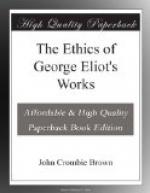‘Silas Marner,’ though carefully finished, is of slighter character than any of the author’s later works, and does not require lengthened notice. In Godfrey Cass we have again, though largely modified, the type of character in which self is the main object of regard, and in which, therefore, with much that is likeable, and even, for the circumstances in which it has grown up, estimable, there is little depth, truth, or steadfastness. Repentance, and, so far as it is possible, restoration, come to him mainly through the silent ministration of a purer and better nature than his own: but the self-pleasing of the past has brought about that which no repentance can fully reverse or restore. Even on the surface this is shown; for Eppie, unowned and neglected, can never become his daughter. But—far beyond and beneath this—we have here, and elsewhere throughout the author’s works, indicated to us one of the most solemn, and, at the same time, most certain truths of our existence: that there are forms of accepted and fostered evil so vital that no repentance can fully blot them out from the present or the future of life. No turning away from the accursed thing, no discipline, no futurity near or far, can ever place Arthur Donnithorne or Godfrey Cass alongside Dinah Morris or Adam Bede. Their irreversible part of self-worship precludes them, by the very laws of our being, from the highest and broadest achievement of life and destiny.
Leaving for the present ‘Romola,’ as in many respects more directly linking itself with George Eliot’s great poetic effort, ’The Spanish Gypsy,’ we turn for a little to ‘Felix Holt,’ the next of her English tales. It would be perhaps natural to select, from among the characters here presented to us, in illustration of life consciously attuning itself to the highest aim irrespective of any end save that aim itself, one or other of the two in whom this is most palpably presented to us—Felix himself or Esther Lyon. We prefer, however, selecting Harold Transome, certainly one of the most difficult and one of the most strikingly wrought out conceptions, not only in the works of George Eliot, but in modern fiction.
Harold, we believe, is not a general favourite with the modern public, any more than he was with his own contemporaries. He has none of those lovablenesses which make Arthur Donnithorne so attractive; and at first sight nothing of that uncompromising sense of right which characterises Adam Bede. He comes before us apparently no more than a clearheaded, hard, shrewd, successful man of the world, greatly alive to his own interests and importance, and with no particular principles to boast of.




